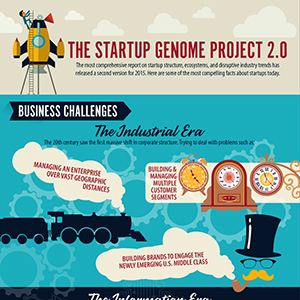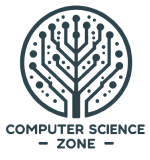
The Startup Genome Project 2.0
The most comprehensive report on startup structure, ecosystems, and disruptive industry trends has released a second version for 2015. Here are some of the most compelling facts about startups today.
Business challenges
The Industrial Era:
The 20th century saw the first massive shift in corporate structure. Trying to deal with problems such as:
Managing an enterprise over vast geographic distances
Building and managing multiple customer segments
Building brands to engage the newly emerging U.S. Middle Class
The Information Era:
21st century businesses are dealing with an inversion of these issues,including:
Instant connectivity between customers and business
Plummeting cost of entry for new ventures
Global competition
Re-imagining new and traditional markets as part of a connected world
The new business lessons learned by startups are expected to lead the massive restructuring of all traditional corporate structures by the middle of the 21st century.
So What Is a Startup?
Traditional small businesses have around 75% success rates over their first two years.
Startups–even with VC backing–have a 75% chance of failing.
What it takes to make them work:
1.)A-Players:
Have the vision, execution, risk-taking profile, listening skills, leadership, and fear of failure to create things no one else has before, often with very little direction.
2.)Close proximity:
Early stage startups can change course multiple times a day, with core team members working late into the night. Workspaces are often not even separated so everyone can stay on the same quickly changing page.
3.)Feedback loops:
With limited money (time) and exposure in their hands, entrepreneurs need access to customer feedback. Mentors often help with strategizing, marketing, financing, taxes, legalities, and pacing.
Entrepreneurs with mentors saw 3.5 times more growth and 7 times more investment than those without mentors.
4.)An ecosystem with built in experience:
Certain geographic regions have had decades of drastically higher startup concentrations.
Silicon Valley Case Study:
1950’s-1978: Defense era
Key players: NASA Ames, Lockheed Missile & Space Division, United Defense, Hewlett Packard
1979-1986: Integrated Circuits era
Key players: Shockley Semiconductor, Fairchild Semiconductor, Intel, AMD, National Semiconductor, over 50 other semiconductor firms.
1987-1996: Personal Computer Era
Key players: Xerox, PARC, SRI, Homebrew Computer Club, Apple, 15+ computer companies
1997-2005: Internet Era
Key Players: Netscape, Cisco, Google, SRI, hundreds of internet companies in region.
2006-2013: Social Media Era
Key players: LinkedIn, Facebook, hundreds of social media companies.
Startup Ecosystems Ranked:
1. Silicon Valley
2. New York
3. Los Angeles
4. Boston
5. Tel Aviv
6. London
7. Chicago
8. Seattle
9. Berlin
10. Singapore
11. Paris
12. Sao Paulo
13. Moscow
14. Austin
15. Bangelore
16. Sydney
17. Toronto
18. Vancouver
19. Amsterdam
20. Montreal
Biggest leaps in rankings include New York (#5-#2), Austin (unranked to #14), Bangalore (#19-#15), Singapore (#17-#10), Chicago (#10-#7)
By Metric:
Performance Top 10
1. Silicon Valley
2. New York City
3. Boston
4. Los Angeles
5. London
6. Tel Aviv
7. Berlin
8. Chicago
9. Sao Paulo
10. Bangelore
Though other ecosystems are expanding rapidly, Silicon Valley still currently has as much capital and exit volume as the other top 20 ecosystems combined.
Funding top 10
1. Silicon Valley
2. New York City
3. Boston
4. Los Angeles
5. Tel Aviv
6. Bangalore
7. Sao Paulo
8. Berlin
9. Singapore
10. London
Market Reach Top 10
1. New York City
2. Los Angeles
3. London
4. Silicon Valley
5. Chicago
6. Paris
7. Boston
8. Moscow
9. Singapore
10. Amsterdam
Talent Top 10
1. Silicon Valley
2. Moscow
3. Tel Aviv
4. Seattle
5. Austin
6. Sydney
7. London
8. Berlin
9. New York City
10. Los Angeles
Startup Experience Top 10
1. Silicon Valley
2. Austin
3. Seattle
4. New York City
5. Los Angeles
6. Tel Aviv
7. Boston
8. Berlin
9. Singapore
10. Sydney
Fastest Growing Startup Ecosystems:
1. Austin
2. Bangalore
3. Sao Paulo
4. London
5. Amsterdam
6. Tel Aviv
7. Chicago
8. Boston
9. Silicon Valley (tie)
9. Seattle (tie)
The Capitol of Change
The entire U.S. GDP is $15 trillion
$1 trillion of this new wealth is accounted for by 9 tech companies that barely existed 15 years ago:
Apple, Amazon, Google, Salesforce, VMware, Facebook, Twitter, Groupon, and Zynga.
Let’s take a look at what ecosystems work best.
1.) Silicon Valley
Startup Output: 14,000-19,000
Startup density: 3 times greater than any other ecosystem
— Silicon Valley has a 40 day average time to hire an engineer [the lowest in the US]
Founders:
24% Female
Average age: 36.2 years old
35% have experience in hypergrowth startups
85% of firms have a technical founder
Funding:
Average seed round: $900k-$950k
Average Series A Funding Round: $6.5M-$7M
Talent:
29% female
43% work remotely
70% are foreign born
48% have worked in a previous startup
Average salary: $118,000
2.) New York City
Startup Output: 7,100-9,600
Startup density: around 1/4th of Silicon Valley
–The cost of capital in New York is lower than Silicon Valley, and the market reach is larger.
Founders:
16% female
Average age: 34.8 years old
18% have experience in hypergrowth startups
100% of firms have a technical founder
Funding:
Average seed round: $850k-$900k
Average Series A Funding Round: $7.5M-$8M
Talent:
28% female
27% work remotely
34% foreign
53% have worked at a previous startup
Average salary: $114,000
3.) Los Angeles and Orange County
Startup Output: 5,500-8,300
Startup density: almost 1/3rd of silicon valley
–Southern California produces around 3,000 software engineer graduates a year. More than any other metro in the US
Founders:
22% female
Average age: 37.6 years old
18% have experience in hypergrowth startups
71% have firms with a technical founder
Funding:
Average seed round: $750k-$800k
Average Series A Funding Round: $6M-$6.5M
Talent:
28% female
32% work remotely
29% foreign
47% have worked at a previous startup
Average salary: $109,000

Citations:
Compass.co’s 2015 Global Startup Ecosystem Ranking

